Monday, December 29, 2008
from the vault
i've been writing since i first discovered all that was hidden in my mind & within the various realities that surround us.
my writing incompases a wide variety of poetry styles such as:
avant-garde, surrealism, spoken word, free verse, concrete & visual.
feel free to click on the above styles, if you wish to learn more.
i've been thinking about creating a few zines of my work; which may be available for sale on our etsy site sometime in the new year. For those who are interested, i'll post a notice on this blog, when they are ready.
Until then...please enjoy a few poems from my vault:
~aymi
~ ~ ~
seekers
blue color boys
in the peep-show
love the ride.
bucket seats
& reptiles...
line me up,
for my cut
~ ~ ~
~ ~ ~
Untitled four
You see your flesh -
as a base to the unforgiving.
-
You whisper the heard words -
as scar tissue.
While roping drugged elite dragons...
we shield impressions -
- strictly for business.
~ ~ ~
~ ~ ~
men
The thing about men is...
their skin rhymes with
delicate wondering of doilies / dreamy gazes...
uncontrollable urge.
The thing about men is...
their sick smelling silk - dripping drops of turpentine
to clean up our mess -
- with my mind...
their careful conscience
always...
~ ~ ~
~ ~ ~
benzene
Drag deeply your scented skin
{lonely & withering}
See easily you do
through my awareness
{twisted & diluted}
Delicate…
is my anger for longing.
~ ~ ~
{all above 'poems' are from the mind of aymi, who retains all rights blahblah etc}
Luverly of the Week: The Poppy Tree by Melody Sage

The Poppy Tree by Melody Sage
Ya, my jaw dropped when I saw this talented woman's artwork. Go check out her store on Etsy!
I ended up buying a print of her work Potential for Aymi, which is below. Oh, and stay tuned for a full post on the rest of our Etsy holiday treasures ;)
Sláinte!
Laurel
Wednesday, December 24, 2008
Happy Holidays!
Tuesday, December 23, 2008
Wortcunning: European Holly {Ilex aquifolium}

From Flora von Deutschland
I couldn't do a profile just before Christmas, without doing one on holly as well! Just as with mistletoe, there are plenty of different varieties of holly, but for this post I am focusing on the European holly (Ilex aquifolium).
Other Names: Tinne, Cuileann, Christ's Thorn, Hulver Bush, Hulm, Holme Chase, Bat's Wings.
Description: European holly is an evergreen tree or bush that is native to most of Europe, as well as some parts of Africa and Asia.
It can reportedly grow up to 25 m tall, but takes quite a long time to reach maturity. The leaves are smooth, shiny, and variable in shape; often they resemble jagged teeth and are about 5 to 10 cm long and 2 to 5 cm wide.
The flowers are white and dioecious, and the berries are that signature red.
Warnings: As with all herbs, one should make sure to be thoroughly informed before ingesting them, and is best to do so under the guidance of a qualified healer.
The berries are toxic and if enough is ingested, it can cause death. Other parts of the plant can be toxic as well. Beside fatality, more likely unpleasant side effects can include vomiting, diarrhea, and a dopey state.
Avoid ingesting if you are pregnant or nursing.
Photo by Emilio del Prado
Cultivating: European holly's natural habitat is usually a woodland setting that is inhabited by trees such as oaks, poplars, and elm.
Saplings can be readily bought in stores and garden centres, and should be planted in the ground once there is no risk of frost. It prefers partial shade, and well-drained, fertile soil that is a little acidic. Mulching is a good idea.
It flowers around May, and if you want berries you will need to plant male and females within 100 feet of each other. It is hardy to about a zone 5 and is frost tender.
Medicinal/Remedial Properties and Lore: Astringent, bach, diaphoretic, diuretic, emetic, expectorant, febrifuge, purgative.
At one time holly infusions were used for pleurisy and smallpox, and was used to help calm fevers and symptoms of rheumatism.
Culpeper thought that it was an excellent cure for colic, and good for mending broken bones. Brother Aloysius also thought it helpful for colic, as well as gout and fevers.
The medicinal properties are rarely harnessed by modern herbalists, but Dr. Edward Bach created an essence made of holly for hatred, anger, and jealousy which is still used today. He wrote of holly essence 'For those who sometimes are attacked by thoughts of such kind as jealousy, envy, revenge, suspicion. For the different forms of vexation. Within themselves they may suffer much, often when there is no real cause for their unhappiness.'
Magical Properties and Lore: According to many different sources, holly is one of the sacred trees of the Druids, and as previously mentioned in my mistletoe post, it may have actually been holly that Cesar had seen being harvested by Druids with gold sickles 5 days after the new moon of Yule.
In Celtic Tree Magic by Elizabeth Pepper, she claims that along with the oak and ash, holly were favoured trees in the groves where Druids worshipped. She also makes a connection between the battle of Sir Gawain and the Green Knight with the battle of the Oak King and Holly King:
'...the oak and the holly trees are two Divine Kings, one representing the waxing half of the year when the sun rises to its height at summer solstice, the other as symbol of the waning cycle as the sun retreats to its lowest point at midwinter solstice. The Celtic myth of Sir Gawain and the Green Knight has the two opponents meeting in combat at midsummer and midwinter. Gawain carries a club of oak. The Green Knight's weapon is a bough of holly.'
By some it is thought that the custom of hanging boughs of holly to decorate homes at Christmas originated in ancient Rome where they would 'deck the halls' for Saturnalia.
Holly has long been noted as a herb of protection; Pliny said, 'the branches of the tree defends houses from lightening and men from witchcraft.' Holly can also be planted around one's home to protect against being blasted (cursed).
It is sometimes associated with divination. In Northern Europe, a charm was made to encourage dreams of one's future spouse. One would go out on a Friday at midnight and collect 9 holly leaves, and then tied with nine knots with a pure white 3-cornered handkerchief (Encyclopedia of Superstitions, by Edwin Radford).
Holly is considered sacred to the Dagda and the Goddesses Banba, Macha, and Danu.
A vintage holiday card from The Graphics Fairy
Other Uses: Holly wood is excellent for wands, and wood carving art.Sláinte!
Laurel
Monday, December 22, 2008
Sunday, December 21, 2008
Wortcunning: European Mistletoe {Viscum album}

From Flora von Deutschland
Along with conifers, poinsettias and holly, mistletoe is one of the plants most associated with this season. So, a perfect time of year to have a profile on it, methinks.
There are other types of mistletoe, but for this post, I am focusing on the European variety (Viscum album).
Other Names: Herbe de la Croix, Birdlime, Mistletan.
Description: The European mistletoe is native to the UK/Northern Ireland, as well as to much of Europe. It is a hemiparastic evergreen that lives in mostly deciduous trees, and is compatible with at least 200 different host species.
It forms 'bushes' on the branches of trees, that are anywhere from 1.5 to 6 feet in diameter. The leaves are shaped like a tongue and they have white, round berries whose sticky juices have been noted to resemble semen.
Warnings: As with all herbs, one should make sure to be thoroughly informed before ingesting them, and is best to do so under the guidance of a qualified healer.
According to the National Centre for Complimentary and Alternative Medicine, 'Raw, unprocessed mistletoe is poisonous. Eating raw, unprocessed European mistletoe or American mistletoe can cause vomiting, seizures, a slowing of the heart rate, and even death.'
As well, they point out that in countries such as Germany have mistletoe that is available for therapeutic injection. There are potential side effects such as 'itching or redness in the area of the injection. Less commonly, side effects may include more extensive skin reactions, low-grade fevers, or flu-like symptoms. There have been very rare reports of more serious allergic reactions, such as difficulty breathing.'
Also, avoid while pregnant, as it is known to cause contractions of the uterus.
Cultivating: Germination for the mistletoe usually begins once a bird's business is dropped on a its new host; the seeds sprout from the pile of bird poop, and then takes root in the bark of the tree.
The mistletoe mainly uses its host as a source of water and mineral nutrients, while its leaves do some photosynthesis. It usually bears fruit around the Winter Solstice.
According to Mrs. M Grieve, one could quite easily cultivate their own mistletoe simply by 'rubbing the berries on the smooth bark of the underside of the branches of trees till they adhere, or inserting them in clefts made for the purpose'.
It is hardy to about a zone 5, and grows best in dappled shade. Brother Aloysius suggests that you 'gather in the Autumn or Winter' and that it should be 'thoroughly dried and preserved in well-corked glass pots'.
Medicinal/Remedial Properties and Lore: Antispasmodic, cardiac, cytostatic, diuretic, emmengogue, haemostat, hypotensive, narcotic, nervine, stimulant, tonic, vasodilator.
Culpeper said that 'misselto doth molify hard knots, tumours, and imposthumes' and 'is a cephalic and nervine medicine, useful for convulsive fits, palsy, and vertigo.'
Brother Aloysius recommended it for 'watery gall, acid stomach, phlegm in the chest, jaundice, ling sores, internal sores' as well as 'convulsions, hysteria, St. Vitus' Dance, and whopping cough'.
Today mistletoe is mainly used for headaches, to lower blood pressure, to relieve anxiety and sleeplessness, and there are studies being done in it's effectiveness in combating cancer.
A holiday postcard, circa 1900 from Wikipedia
Magical Properties and Lore: It is said that Cesar saw Druids 5 days after the new moon following the Winter Solstice, climbing into oak trees and cutting mistletoe with golden sickles for ritual use. There are disagreements as to whether it was actually mistletoe or holly that they were cutting down.
According to Paul Beyerl's Master Book of Herbalism mistletoe is 'a Fertility Herbe, Herbe of Protection, and a Visionary Herbe'. For a Yule ritual in his book, people should toss a mistletoe berry into the hearth-fire to represent those personal things that one desires, as the sun comes back.
Mistletoe is associated with solar deities because it bears fruit as the sun it at it's lowest point (the Sun God dies and is reborn), and also lunar deities (Moon Goddesses) because of it's round, white fruit.
Once gathered, many sources say that it should not touch the ground, and it does indeed have many potential uses.
For protection, in Culpeper's Complete Herbal, he says that is can be hung around the neck to 'remedy witchcraft'. Also, sprigs can be hung on doorways to protect houses from lightening and evil spirits; it can be placed by a cradle to avoid faeries (careful that little hands can't reach it!); hung in a barn to protect a herd of cattle and buried in a field to protect a crop.
For this time of year, string up some mistletoe to get some kisses ;)
Where this custom actually originated from I am not sure, but there are a few that I have seen:
One involves the Norse God Baldr, who is killed by an arrow made of mistletoe, that is shot by Loki. After Baldr dies, Frigg cries and her tears become the white berries. In one version of the story, Baldr comes back to life, and Frigg is so happy that she blesses the mistletoe and says she will bestow a kiss to anyone who stands underneath it.
Under the Mistletoe, 1873
Another folktale says that if warring foes came under a tree with mistletoe on it, they would lay down their arms and kiss each other as a sign of peace.
Other Uses: It has long been thought that mistletoe is just a pest that not only kills off trees, but degrades entire habitats. But, according to a study done on the relationship between junipers and mistletoe, the mistletoe can actually play a role in protecting biodiversity.
Sláinte!
Laurel
Merry Yule!

Saturday, December 20, 2008
My oranges r green & blue...
this was my first video i ever made for a poem.
there are a few things i would change/add to the video, to inspire the feelings i was trying to inspire with this poem. i may at some point, re-make this video, which is quite rare for me to say, since all of my poetry are written in one fell-swoop, so to speak.
i would also say that about all of my artistic writings.
No editing. No going back and fixing a line..a word. It’s almost a ritual.
i record on paper, words-visions-dreams, verses, thoughts...how they come out, is how they stay.
Pure lustful boldness; one could say.
Friday, December 19, 2008
Eco-conscious & Crafty? Then Check Out This Webby!
There's some real nifty project over there. Go and check them out :)
Sláinte!
Laurel
Butterfly Award

A fellow Etsy-er (click for her wonderful shoppe!) and blogger, the luverly Rose, has made us blush by choosing our blog for the Butterfly Award.
So, now we will choose 10 blogs that we love to read to pass this award on to. In no particular order:
Faery Log
Digital Dryad
Poor Richard's Almanac
The Garden Brae
Manic Gardener
Heavy Petal
Seasonal Ontario Food
Cold Antler Farm
Crafty Gardener
Equus Villa
Now the folks who we've passed the award onto are ask to:
1. Post a copy on your blog.
2. Mention who gave you the award.
3. Pass the award on to 10 others.
4. Leave a message on their blog letting them know they have been awarded.
Sláinte!
Aymi & Laurel
Thursday, December 18, 2008
Celtic Christmas Podcast
There's some really pretty tunes, I especially loved the Da Day Dawn by Samantha Gillogly. As an aside, she has some free Winter Solstice tunes available on her webby.
Sláinte!
Laurel
Wednesday, December 17, 2008
Luverly of the Week: Sledding Party by Sulamith Wulfing

Sledding Party by Sulamith Wulfing
I LOVE this artist! She has made a whole slew of luverly artwork, including quite a few pieces fit for this season. For Winter/the Holidays these two are 'honourable mentions' luverlies:
Christmas Balls:

Light Bearer:

International Day to End Violence Against Sex Workers

Today (December 17th) is International Day to End Violence Against Sex Workers.
Regardless of one's moral views on sex work, no one who is humane and sound of mind can justify the slaughter and oppression of sex workers. We feel the only way to end violence against sex workers is by having a paradigm shift on a societal scale.
It's time that policy and law makers start listening to sex workers themselves. Many are calling for the decriminalization of all consenting adult sex work, the right to self-determination and to be recognized as legitimate workers and business people.

To find out more about decriminalization, go to the Sex Professionals of Canada website. Also, if this message resonates with you, look up your regional or national sex worker organization, and see how you can get involved.
Sláinte!
Aymi & Laurel

All Photos in the post are from the Sex Professionals of Canada website, and were taken by John Bonnar.
Tuesday, December 16, 2008
Some Holiday Stuff
I really can't be bothered to spend a tonne of money and time decorating the whole house, but I do pay special attention to our altar (handmade and natural is always best in this department anyways). Over time I have accumulated different ornies made by others and myself, vintage finds and hand-me-downs, and I have made a few this year.
We do have a tree, but it is not typical (at least not for the North!). We deck our banana tree, which doesn't seem to mind too much. Lol.
Here are a few ornies I made this year:


I found the design for the sheep at The Krazy Kraft Lady's Blog. Mine is obviously a tad bit different lacking the little heart and tag, and is made of an old stained towel, wool socks, a vintage button, a safety pin and rusty bell, and some hemp twine.



The birdies were made from left over fabric and ribbon, and some buttons and safety pins that were laying around.



I also made some dried apple ornaments, and there is a pretty good how-to over at Hometraditions.
A few other shots

Cute little owl from Hibou Boutique


A wreath put together a couple of years ago. A local woman made the wreath out of grape vines, and I added the bells, ribbon and bottle cap.


A pretty little ornie made by my Grandma some years back with dried flowers from her garden.

A hand-me-down from Grandma. I am assuming it's pretty old school.


Little vintage birdies waiting for a pillar candle.

Winter scene painted on slate by Canadian artist Mark S Tolangen
Sláinte!
Laurel
Monday, December 15, 2008
Places I Have Loved: Duchesnay Falls
We harvested some wild herbs and food (red clover, tansy, St. John's wort, rowan berries, yarrow, raspberry leaves/fruit, blueberries, blackberries, chamomile, and sweetfern) and went on a little 'hunt for Faeries'
Here are a few of the photos taken. Enjoy!
Sláinte!
Laurel
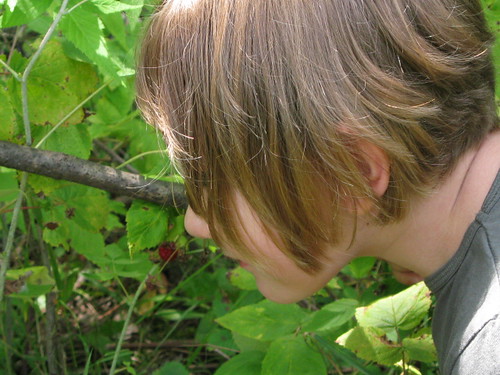
Having a boo at something
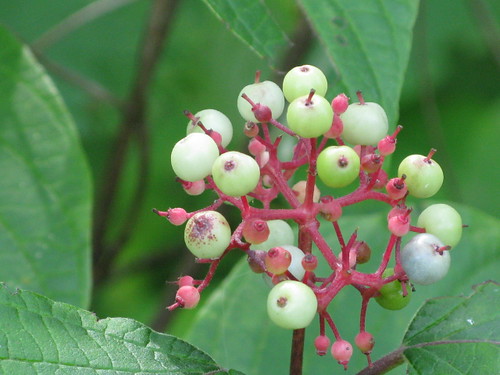
Dogwood
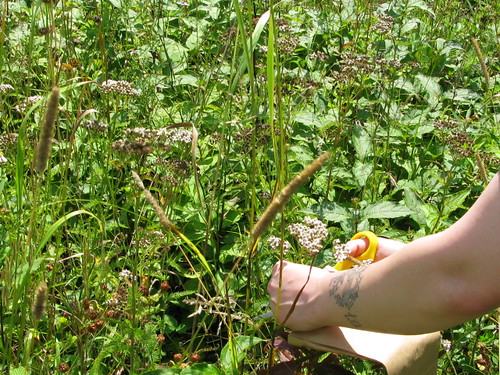
Harvesting yarrow
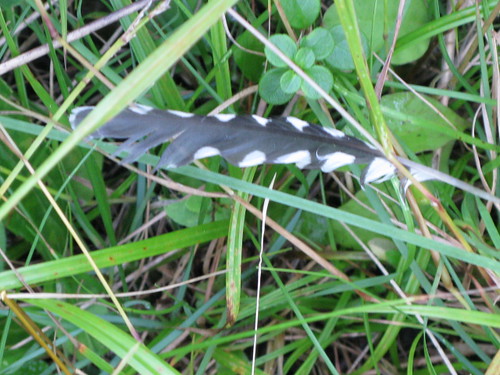
A bluejay feather methinks
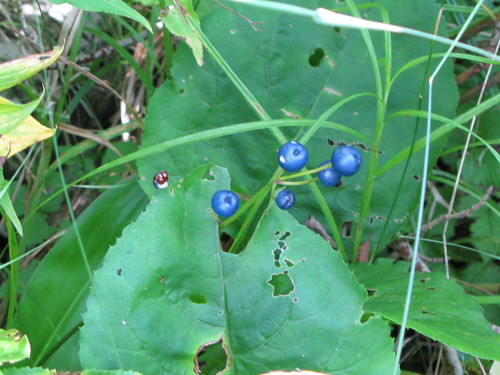
Pretty sure blue bead lily
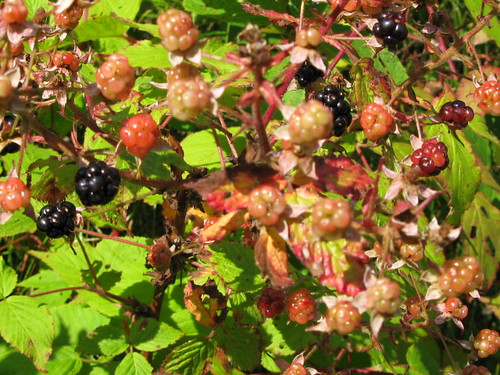
Yum
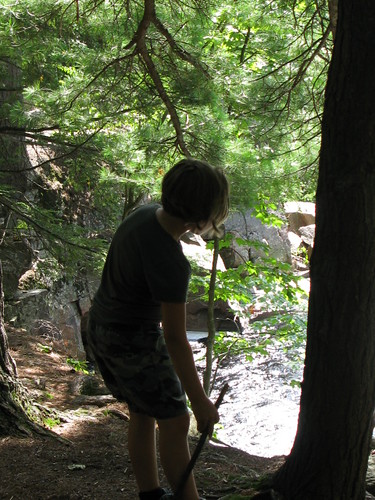
Down by the river

Resting
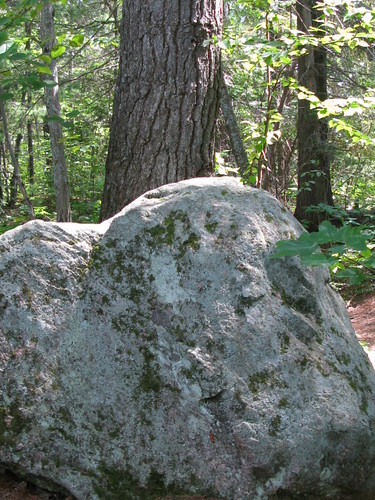
Rock where many locals leave the forest fae/spirits and other residents offerings
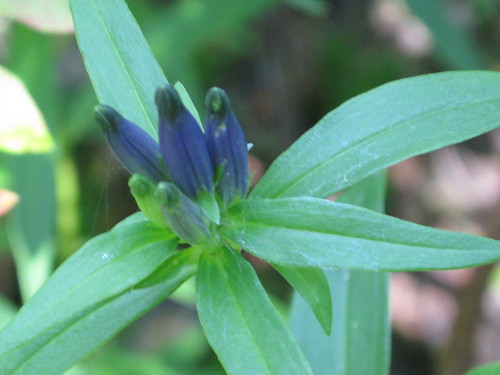
Not quite sure, does anyone know what this is?
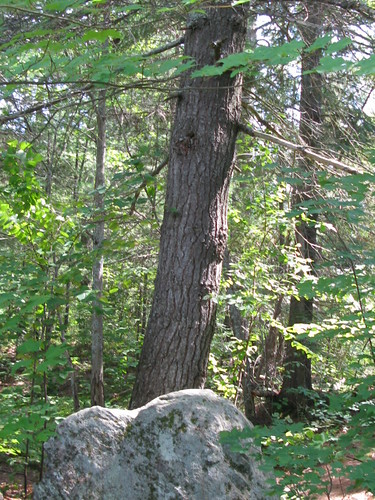
Another shot of the offering rock

Just pretty
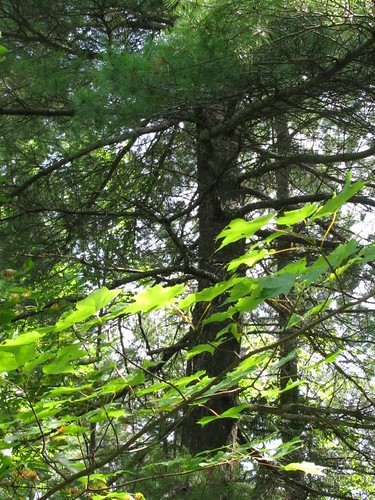
More prettiness







